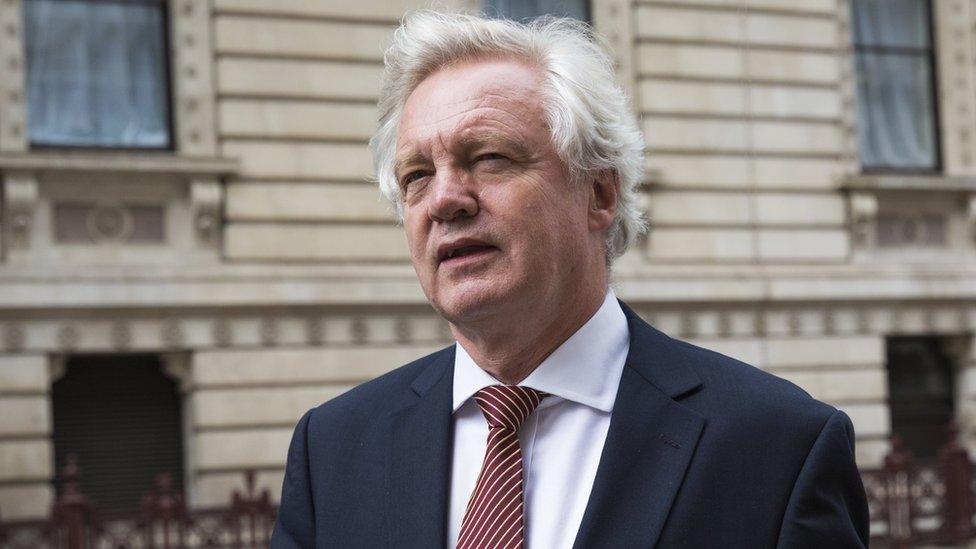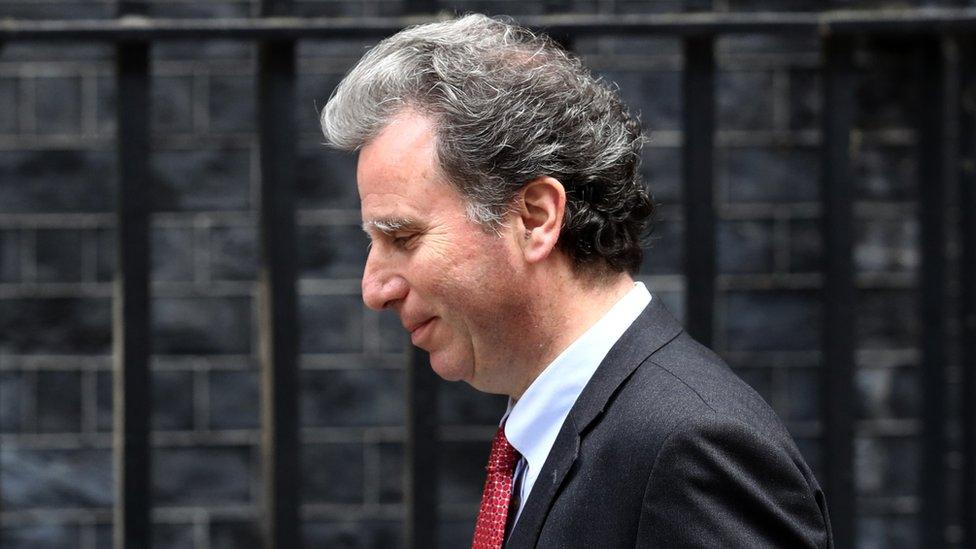David Davis: Trigger Brexit by start of 2017
- Published

The new minister in charge of Brexit says the UK should be able to formally trigger its departure from the EU "before or by the start of next year".
David Davis called for a "brisk but measured" approach, with a likely exit from the EU around December 2018.
He said the "first order of business" should be to strike trade deals with non EU countries.
Meanwhile his predecessor, Oliver Letwin, warned the UK had no trade negotiators to lead its exit talks.
Mr Davis, a longstanding campaigner for Brexit, was appointed as secretary of state for leaving the EU by new prime minister Theresa May.
Mrs May has previously said she will not trigger Article 50 of the Lisbon Treaty, which starts a two-year process of leaving, before the end of 2016.
'Ideal outcome'
In a Sun article, external, Mr Davis repeated comments made just before his appointment about how the UK should approach its departure from the EU.
Key to the negotiations will be access to the European single market, which EU leaders have said is conditional on accepting the free movement of people.
Mr Davis said the "ideal outcome" would be "continued tariff-free access" to the EU single market, adding: "Once the European nations realise we will not budge on control of our borders, they will want to talk, in their own interests.
"But what if they are irrational, as so many Remain-supporting commentators asserted they would be in the run-up to the referendum?
"This is one of the reasons for taking a little time before triggering Article 50. The negotiating strategy has to be properly designed, with serious consultation."

Oliver Letwin headed up the government's Brexit unit until he was sacked by the new prime minister
He said the government should consult beforehand with the Scottish, Welsh and Northern Irish governments as well as business, unions and universities.
"This whole process should be completed to allow triggering of Article 50 before or by the start of next year," he said.
Prior to Mr Davis's appointment, Oliver Letwin was in charge of a "Brexit unit" inside the government.
Mr Letwin, who was fired by Mrs May when she took over, told BBC Radio 4's Today programme that because the EU had led trade talks with other countries since 1973, "we do not have trade negotiators", adding: "Trade negotiators who are Brits at the moment are basically working for the EU."
It would be up to them whether they switched to working for the UK, he said.
Mr Letwin said he had left "the beginnings of groundwork" for Mr Davis, describing him as a "jolly tough cookie".
Mr Davis would need to hire a group to deal with the EU negotiations who would then train up a "cadre" of civil servants, Mr Letwin said.
'Changing the guard'
Asked how long the negotiations would take, he added: "We will only know as we go along just how tricky this will be and how long that takes."
Alongside Mr Davis, other Brexit campaigners were given prominent jobs including former Defence Secretary Liam Fox, who is in charge of negotiating international trade deals, and Boris Johnson, who was made foreign secretary.
Despite his sacking, Mr Letwin said Mrs May was "manifestly the right person" to take over as prime minister.
"It was clear that Theresa was forming a different kind of cabinet, and I was not to be part of it," he said, denying her appointments represented a purge of David Cameron's allies.
"When you change the guard, you change the guard," he added. "It's a natural process."
Meanwhile Canada's trade minister said her country had been sharing details of its trade deal with the EU with the UK.
The Comprehensive Economic and Trade Agreement (Ceta) between has been cited by Mr Davis as a possible blueprint for the UK's future relationship with the EU once it leaves.
Chrystia Freeland, who is due to meet the UK's new International Trade Secretary Liam Fox later, said there had already been some "technical exchanges", with some "real details of exactly how Ceta works" shared with the UK.
She said it was a "great deal as trade deals go", but was a "significantly less close relationship" than EU membership.
For example, she said, it does not include the rights for financial firms to trade unhindered across the EU under rights known as "passporting" and has less "labour mobility" than full membership.